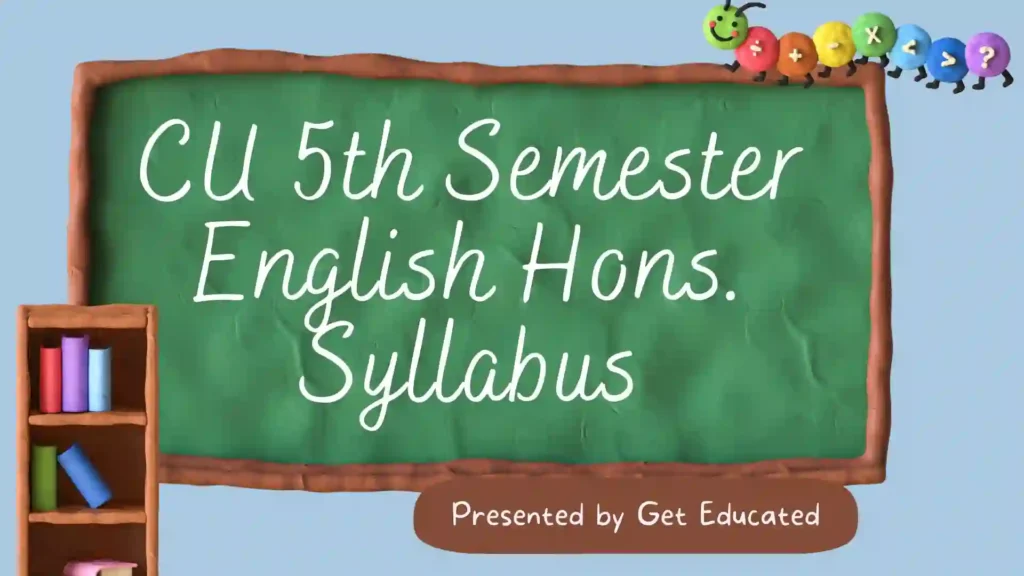If you’re looking for the Latest 5th Semester English Honours Syllabus of Calcutta University (CU) and its affiliated colleges, then you’re in the right place! In this post I will share detailed syllabus for each topic, prescribed by CU.

Core Course (CC)
- CC11 – WOMEN’S WRITING
- CC12 – EARLY 20TH CENTURY BRITISH LITERATURE
Discipline Specific Elective (DSE) – A
- DSE-A1 –MODERN INDIAN WRITING IN ENGLISH TRANSLATION
OR,
- DSE-A2 –LITERARY THEORY AND LITERARY CRITICISM
Discipline Specific Elective (DSE) – B
- DSE-B1– LITERARY TYPES, RHETORIC AND PROSODY
OR,
- DSE-B2–CONTEMPORARY INDIA: WOMEN AND EMPOWERMENT
Detailed Course (CC)
CC11 – WOMEN’S WRITING
Poetry :
Emily Dickinson, ‘I cannot live with you’
Elizabeth Barrett Browning, ‘How do I love thee’
Eunice De Souza, ‘Advice to Women’
Fiction :
Alice Walker, Color Purple OR Emily Bronte, Wuthering Heights
Mahasweta Devi, ‘Draupadi’, translated Gayatri Chakravorty Spivak
Katherine Mansfield, ‘Bliss’
Non-Fiction :
Mary Wollstonecraft, A Vindication of the Rights of Woman, Chapters I
& II (New York: Norton, 1988)
Rassundari Devi, Amar Jiban, translated Enakshi Chatterjee, Writers’
Workshop.
End Semester Question Pattern :
Objective – 5 marks
One question of 15 marks from poetry (out of two)
Two questions of 15 marks each from fiction (out of three, one
from each)
One question of 15 marks from non-fiction (out of two, one from
each)
Suggested Readings:
- Virginia Woolf, A Room of One’s Own (New York: Harcourt, 1957) chaps. 1 and 6.
- Simone de Beauvoir, ‘Introduction’, in The Second Sex, tr. Constance Borde and Shiela Malovany-Chevallier (London: Vintage, 2010) pp. 3–18.
- Kumkum Sangari and Sudesh Vaid, eds., ‘Introduction’, in Recasting Women: Essays in Colonial History (New Delhi: Kali for Women, 1989) pp. 1–25.
- Chandra Talapade Mohanty,‘Under Western Eyes: Feminist Scholarship and Colonial Discourses’, in Contemporary Postcolonial Theory: A Reader, ed. Padmini Mongia (New York: Arnold, 1996) pp. 172–97
- ‘Feminist Criticism’ in Peter Barry, Beginning Theory, Chennai: T.R. Publications
CC12 – EARLY 20TH CENTURY BRITISH LITERATURE
Poetry :
T.S. Eliot, ‘The Love Song of J. Alfred Prufrock’ and ‘Preludes’
W.B. Yeats, ‘The Second Coming’ and ‘No Second Troy’
Wilfred Owen, ‘Spring Offensive’
Fiction :
Joseph Conrad, Heart of Darkness
D.H. Lawrence, Sons and Lovers
Drama :
George Bernard Shaw, Pygmalion
End Semester Question Pattern:
Objective – 5 marks
One question of 15 marks from poetry (out of two)
Two questions of 15 marks each (one from each) from fiction
(out of four, two from each)
One question of 15 marks from drama (out of two)
Suggested Readings :
- Sigmund Freud, ‘Theory of Dreams’, ‘Oedipus Complex’, and ‘The Structure of the Unconscious’, in The Modern Tradition, ed. Richard Ellman et. al. (Oxford: OUP, 1965) pp. 571, 578–80, 559–63.
- T.S. Eliot, ‘Tradition and the Individual Talent’, in D.J. Enright and Ernst D. Chickera eds. English Critical Texts, Delhi: OUP
- Raymond Williams, ‘Introduction’, in The English Novel from Dickens to Lawrence (London: Hogarth Press, 1984) pp. 9–27.
- Raymond Williams, ‘Introduction’, in Drama from Ibsen to Brecht, Penguin, 1973
Detailed Course (DSE-A)
DSE-A1 –MODERN INDIAN WRITING IN ENGLISH TRANSLATION
Stories :
Munshi Prem Chand, ‘The Shroud’
Ismat Chugtai, ‘The Quilt’
Fakir Mohan Senapati, ‘Rebati’
Poetry :
Rabindranath Tagore, ‘Light, oh where is the light?’ (Gitanjali XXVII)
and ‘When my play was with thee’ (Gitanjali XCVII)
G.M. Muktibodh, ‘The Void’
Amrita Pritam, ‘I say unto Waris Shah’
Novel :
Rabindranath Tagore, The Home and the World
Drama :
Vijay Tendulkar, Silence! The Court is in Session
End Semester Question Pattern :
Objective – 5 marks
One question of 15 marks from story (out of two)
One question of 15 marks from poetry (out of two)
One question of 15 marks from novel (out of two)
One question of 15 marks from drama (out of two)
Suggested Readings :
- Namwar Singh, ‘Decolonising the Indian Mind’, tr. Harish Trivedi, Indian Literature, no. 151 (Sept./Oct. 1992).
- B.R. Ambedkar, ‘Annihilation of Caste’ in Dr. Babasaheb Ambedkar: Writings and Speeches, vol. 1 (Maharashtra: Education Department, Government of Maharashtra, 1979) chaps. 4, 6, and 14.
- Sujit Mukherjee, ‘A Link Literature for India’, in Translation as Discovery (Hyderabad: Orient Longman, 1994) pp. 34–45.
- G.N. Devy, ‘Introduction’, from After Amnesia in The G.N. Devy Reader (New Delhi: Orient BlackSwan,2009) pp. 1–5.
OR,
DSE-A2 –LITERARY THEORY AND LITERARY CRITICISM
Literary Theory :
Antonio Gramsci, ‘The Formation of the Intellectuals’ from The Prison
Notebooks
Virginia Woolf: ‘A Room of One’s Own’
Rabindranath Tagore, ‘Nationalism in India’, in Nationalism, with an
Introduction by Ramachandra Guha, New Delhi: Penguin Books
Literary Criticism :
William Wordsworth, ‘Preface’ to the Lyrical Ballads
S.T. Coleridge, Biographia Literaria, Chapters XIII and XIV
T.S. Eliot, ‘Tradition and the Individual Talent’
End Semester Question Pattern :
Objective – 5 marks
Two questions of 15 marks from Literary Theory (out of three,
one from each text)
Two questions of 15 marks from Literary Criticism (out of three,
one from each text)
Suggested Readings :
- Terry Eagleton, Literary Theory: An Introduction (Oxford: Blackwell, 2008)
- Peter Barry, Beginning Theory, Chennai: T.R. Publications, 1999.
- Peter Barry (ed), Issues in Contemporary Critical Theory: A Selection of Critical Essays, A Casebook, Macmillan, 1987
- Raman Selden and Peter Widdowson, A Reader’s Guide to Contemporary Literary Theory, Pearson India, 2006
- C.S. Lewis: Introduction in An Experiment in Criticism, Cambridge University Press 1992
- M.H. Abrams: The Mirror and the Lamp, Oxford University Press,1971
- Rene Wellek, Stephen G. Nicholas: Concepts of Criticism, Connecticut, Yale University 1963
- Taylor and Francis Eds. An Introduction to Literature, Criticism and Theory, Routledge, 1996
Detailed Course (DSE-B)
DSE-B1– LITERARY TYPES, RHETORIC AND PROSODY
Group – A: Literary Types
Tragedy (Tragic Hero, Catharsis, Heroic Tragedy, Chorus)
Comedy (Romantic Comedy, Comedy of Humours, Comedy of
Manners, Sentimental Comedy)
Short Story
Group – B: Rhetoric
Group – C: Prosody
End Semester Question Pattern :
Objective – 5 marks
Two questions of 20 marks from Group A (out of three)
One question of 10 marks from Group B (out of two)
One question of 10 marks from Group C (out of two)
Suggested Readings :
- K.R.S. Iyengar and Prema Nandakumar, Introduction to the Study of English Literature
- S.H. Butcher, Aristotle’s Theory of Poetry and Fine Art, New Delhi: Kalyani Publishers
- Allerdyce Nicoll, The Theory of Drama
- Bose and Sterling, Elements of English Rhetoric and Prosody
OR,
DSE-B2–CONTEMPORARY INDIA: WOMEN AND EMPOWERMENT
Social Construction of Gender
History of Women’s Movement in India (pre-independence and postindependence)
Women and Law: Domestic Violence, Female Foeticide, Sexual Harassment
Dalit Women and Double Marginalisation
End Semester Question Pattern :
Objective – 5 marks
Society, Sex and Gender – 20 marks
History of Women’s Movement in India – 15 marks
Women and Law – 15 marks
Dalit Women – 10 marks
Recommended Readings :
- Rinita Mazumdar, A Short Introduction to Feminist Theory, Kolkata: Anustup, 2010.
- ‘Feminist Criticism’ in Peter Barry, Beginning Theory, Chennai: T.R. Publications, 1999.
- V. Geetha, Gender, Calcutta: Stree, 2002.
- Kate Millet, Sexual Politics, New York: Doubleday, 1970.
- Ann Oakley, Sex, Gender and Society, London: Temple Smith, 1972.
- Ray Raka, Fields of Protest: Women’s Movements in India, New Delhi: Kali for Women, 2000.
- The Sexual Harassment of Women at Workplace, (Prevention, Prohibition and Redressal) Bare Act, New Delhi: Universal, 2014.
- Sharmila Rege, Against the Madness of Manu, B.R. Ambedkar’s Writings on Brahmanical Patriarchy, New Delhi: Navayana, 2013.
- Sandra Gilbert and Susan Gubar, The Madwoman in the Attic: The Woman Writer and the Nineteenth Century Literary Imagination.
